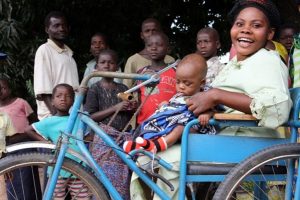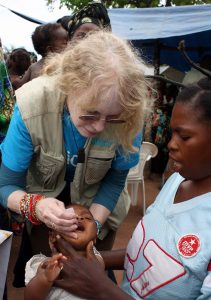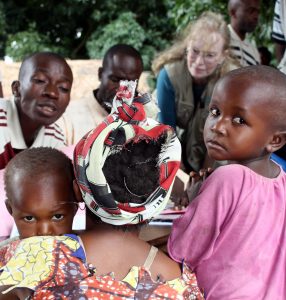Mia Farrow visits Chad, DR Congo
Highlighting the need for high-quality polio vaccination campaigns

1 March, 2012 – “I do not want my daughter to suffer the way I did, and still do’” said Lora, a middle-aged Congolese mother who was paralysed by polio as a young child. “This vaccination will help my baby to grow up strong and healthy.” Last week, while UNICEF Goodwill Ambassador Mia Farrow was visiting the village of Kasabondo in Katanga, one of four polio-infected provinces in the Democratic Republic of the Congo, Lora brought her nine-month-old daughter to be vaccinated against polio at the local health centre.
During her ten day visit to Chad and the Democratic Republic of the Congo, Ms Farrow witnessed the daily efforts of community health workers to deliver quality medical care, including in the most remote rural areas. The star used the opportunity  to draw international attention to the need for high quality polio vaccination campaigns and to meet with the countries’ leadership.
to draw international attention to the need for high quality polio vaccination campaigns and to meet with the countries’ leadership.
“India has demonstrated that we can win the fight against polio and protect all children from the suffering of this potentially deadly and paralysing disease,” said Farrow, who herself had polio as a child, and whose son, adopted from India, is paralysed from the waist down because of polio.
Both Chad and the Democratic Republic of the Congo are considered to have re-established polio transmission. This means that, while both have successfully interrupted transmission in the past, they have since been re-infected and now suffer from ongoing transmission. Chad and the Democratic Republic of the Congo finished last year with the second- and third-most polio cases in the world, with 132 and 93 cases respectively.
I am sorry for what happened to my daughter,” says Ado. Her daughter Lea, 3 years old, was the Democratic Republic of the Congo’s latest polio victim. “Our pastor had told us that vaccination is against god and therefore we refused. Today I know that this was wrong.” In some areas one out of five families rejects the polio vaccine due to religious beliefs or an opposing tradition.
The Democratic Republic of the Congo is caught in a cycle of poverty and conflict. Children are caught by the compounded effect of both. One in four children does not go to school. One in five children dies before reaching the age of five. Almost half of all children under five suffer from stunting due to poor nutrition. Less than half the population has access to safe drinking water. Two thirds of children have no birth certificate.
 |
| UNICEF Goodwill Ambassador Mia Farrow attends a routine vaccination session at the Mother and Child Health Centre in Kasabondo, DR Congo. Cornelia Walther / UNICEF DR Congo |
According to a recent assessment (MICS 2010), the national routine immunization coverage of children between 12 and 23 months has significantly increased over the past decade, from ten percent in 2001 to 42 percent in 2010. Yet progress is mostly limited to middle and high income households. While close to all children in these groups are fully vaccinated by the time they reach their 2nd birthday, not even one in four children from poor families is immunized.
Routine immunization gaps are a central cause of the re-emergence and continued transmission of polio. They are rooted in weak national health services and the persistent refusal of parents with regards to vaccination.
“Imagine a ship, imperilled at sea, with hundreds of children on board. Of course the international community would respond immediately and fully. Yet, each year poverty and polio steal the lives and the childhood of hundreds of thousands of Congolese children. We have the capacity and the moral obligation to save them – but do we have the will?” asked Farrow.













